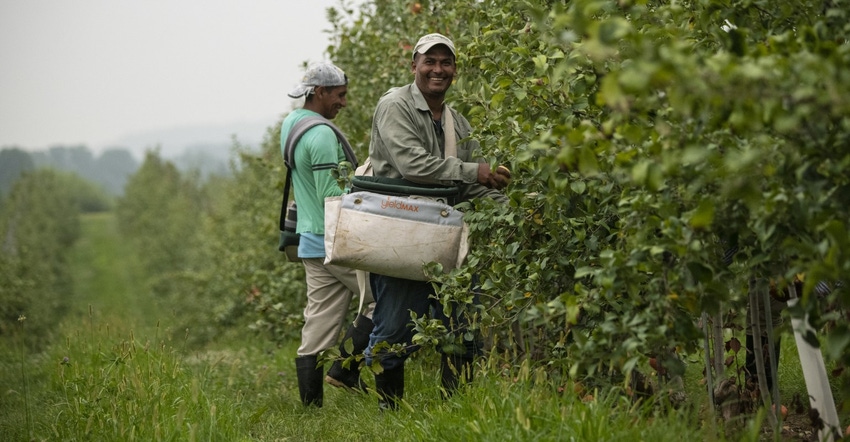Amendment allows use of H-2A temporary ag worker program for dairy and ag operations with year-round needs.

The agriculture industry’s labor situation has been a concern for many years, and currently large segments face a critical shortage of workers. This shortfall is exacerbated by the fact that the H-2A program is not working for all of agriculture, such as dairies and agriculture operations with multiple crops and harvests.
The House Committee on Appropriations approved an amendment introduced by Reps. Dan Newhouse, R-Wash., and Henry Cuellar, D-Texas, to the Fiscal Year 2022 Homeland Security Appropriations Act that would allow the H-2A temporary agriculture guestworker program to be accessed year-round for Fiscal Year 2022, opening the program to producers in all sectors of agriculture, including dairy, greenhouses, and other agricultural operations with year-round labor needs. The amendment was adopted by voice vote.
“Our farmers and ranchers are in desperate need of a legal and reliable workforce,” says Newhouse. “Unfortunately, the H-2A program does not work for all of agriculture. As farming methods have become less seasonal or able to produce multiple harvests, the H-2A program must be updated to meet the needs of the agriculture industry. This amendment supports legal immigration while making H-2A more workable for farmers.”
The dairy industry welcomed the provisions as dairy farmers largely have not been able to use H-2A visas because the current program is limited only to the temporary and seasonal labor needs of agricultural employers.
“The Cuellar-Newhouse bipartisan amendment to this year’s Homeland Security Appropriations bill would allow farm employers to use the H-2A visa program to hire foreign workers, regardless of whether those employees are engaged in temporary or seasonal work. Under this amendment, dairy farmers and other year-round producers could use the H-2A program to supplement their domestic workforce,” says National Milk Producers Federation President and CEO Jim Mulhern.
At the start of July, the National Pork Producers Council introduced a campaign, “Year-Round Pork Needs Year-Round Workers,” highlighting the vital role of foreign-born workers across the U.S. pork industry and the critical need for comprehensive labor reform to address a labor shortage. NPPC is urging Congress to address labor reform that both opens the H-2A visa program to year-round labor, without a cap, and provides legal status for agricultural workers already in the country.
“There are not enough people that want to work in agriculture to fill the jobs that we have. If we're not able to provide people to raise these animals, we're going to have to raise less of them and that means that you're going to pay more for that protein source,” says Michael Springer, a hog farmer from Independence, Kan. “People want to eat 365 days a year. Our current seasonal visa program does not work for livestock production because it does not put people on our farm 365 days a year to take care of the animals."
Rachel Gantz, National Pork Producers Council communications director, adds: “We appreciate Reps. Cuellar and Newhouse for introducing this amendment to address the critical labor shortage in the U.S. pork industry sector, and we look forward to working with lawmakers to expand the H-2A visa program to allow year-round labor.”
Related: House sends ag labor bill to Senate
In March, the House advanced the Farm Workforce Modernization Act, H.R. 1603, by a vote of 247-174. The bill included H-2A reforms which allows for access to the H-2A program for industries with year-round labor needs. Mulhern hopes the inclusion of the H-2A fix will provide impetus for ag labor reform in the Senate.
“Beyond just providing dairy temporary access to the H-2A program, the measure is important because we must continue to build momentum for ag labor reform as we await a Senate measure that carries forward and improves upon the Farm Workforce Modernization Act, which the House approved in a bipartisan vote in March,” he says.
Mulhern adds, “Recent history shows bipartisan support for farm workforce legislation that addresses the needs of producers and farmworkers. It is critical that the government continues to build on these bipartisan efforts to create a system that provides secure, legal employment. We thank lawmakers for their efforts toward achieving this goal.”
In early June, the Agriculture Workforce Coalition sent a letter to Senate majority and minority leaders urging the Senate to pass an agriculture labor reform bill. The letter notes producers with year-round labor needs must be eligible to participate in the H-2A guestworker program without arbitrary limits.
“Without immediate action by the Senate, the federal government’s outdated policies and broken immigration system will force many farmers to consider whether they can continue in labor-intensive agriculture,” the letter states. “As representatives of agricultural organizations throughout the United States, we stand ready to help you develop and pass legislation to fully address the needs of American farmers by stabilizing the current workforce, addressing enormous costs to use the H- 2A program, and enabling year-round producers to access the H-2A program.”
About the Author(s)
You May Also Like




.png?width=300&auto=webp&quality=80&disable=upscale)
